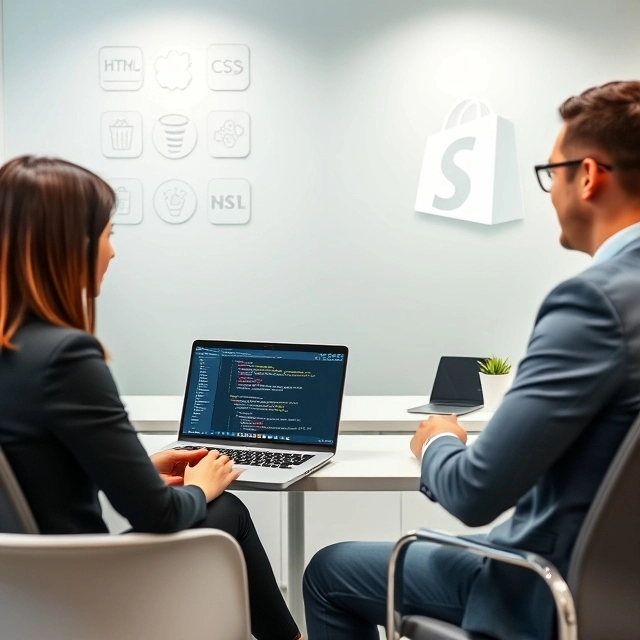
How to Vet and Interview Shopify Developers?
Table of Contents
ToggleHow to Vet and Interview Shopify Developers? Key Questions to Ask
Building a Shopify store is about more than just selling products—it’s about creating an engaging shopping experience that converts visitors into loyal customers. With over 4.4 million Shopify stores globally and e-commerce sales projected to reach $6.3 trillion in 2024, the competition is fierce. A well-designed and functional Shopify store can make all the difference, but this requires the expertise of a skilled developer.
If you’re looking to hire Shopify developers, you need to do more than scan resumes—you need to dig deeper to understand their technical abilities, creativity, and alignment with your business goals. This guide walks you through the key steps and questions to vet and interview Shopify developers effectively, ensuring you hire the right fit for your e-commerce needs.
Why Hiring the Right Shopify Developer Matters?
When it comes to building your online store on Shopify, the developer you hire will play a critical role in shaping the success of your business. A professional Shopify developer will not only help you design a store that aligns with your brand but also optimize it for speed, mobile usability, and conversions.
Hiring the wrong developer can result in an underperforming website that frustrates your customers, hurts your SEO, and causes lost sales. To avoid these risks, it’s important to vet potential candidates thoroughly to ensure they possess the skills and experience necessary to build a top-performing Shopify store.
The Role of a Shopify Developer:
- Customizing Themes: Shopify developers tailor store themes to match your brand’s aesthetic and functionality needs.
- Integrating Apps and APIs: From payment gateways to inventory management, developers ensure smooth third-party integrations.
- Performance Optimization: They reduce load times and enhance mobile responsiveness to improve user experience.
- Problem Solving: Skilled developers troubleshoot bugs, fix issues, and keep your store running efficiently.
By investing in the right talent when you hire Shopify developers, you ensure that your store stands out from the competition and provides an exceptional user experience.
Understanding What Makes a Good Shopify Developer
Before you start vetting Shopify developers, it’s important to understand what makes a developer stand out. Here are some key qualities to look for in a good Shopify developer:
- Technical Proficiency: A top Shopify developer should have a deep understanding of the Shopify platform, its features, and how to build and customize themes, apps, and integrations.
- Problem-Solving Skills: A good developer can solve complex technical issues that may arise during development and troubleshooting.
- Strong Communication: They should be able to communicate effectively and work with your team to understand your goals.
- Attention to Detail: Your developer should be meticulous in ensuring everything on your Shopify store works smoothly, from design elements to checkout processes.
- Experience with SEO: A developer who understands SEO best practices can help optimize your Shopify store for search engines.
Vetting Shopify Developers: How to Evaluate Their Expertise

Once you know what to look for, the next step is to vet your candidates thoroughly. Here’s how to evaluate Shopify developers effectively:
1. Review Their Portfolio
A strong portfolio is one of the best indicators of a Shopify developer’s skills and experience. Look for projects that are similar to your own needs in terms of design, functionality, and industry. A diverse portfolio demonstrates the developer’s versatility and expertise.
2. Check References and Testimonials
Reach out to the developer’s past clients to gather feedback on their experience. Testimonials and case studies can also provide insight into how the developer performs on projects. Ask about their reliability, professionalism, and ability to meet deadlines.
3. Assess Technical Skills
Shopify developers should have experience with various tools, technologies, and best practices. Key technical skills to assess include:
- Proficiency with Shopify Liquid (Shopify’s templating language)
- Experience in custom theme development and theme customization
- Knowledge of Shopify apps and third-party integrations
- Expertise in responsive design for mobile and tablet users
- Familiarity with SEO optimization for eCommerce websites
4. Evaluate Problem-Solving Ability
A developer’s problem-solving skills are crucial for resolving any issues that may arise during development or after launch. Ask candidates how they handle technical challenges or issues they’ve faced in past projects. Look for clear examples of how they solved problems.
5. Understand Their Communication and Collaboration Skills
Your Shopify developer will be a part of your team, so communication is key. They should be responsive, clear, and open to collaboration. Evaluate how they communicate during the interview and whether they can clearly explain complex concepts in layman’s terms.
Key Questions to Ask During the Interview
Now that you know how to vet Shopify developers, here are some key questions to ask during the interview process:
1. Shopify Development Experience
- How many years of experience do you have working with Shopify?
- Can you share some examples of Shopify stores you’ve built or customized?
- Are you familiar with the latest Shopify updates and features?
2. Technical Skills
- What is your experience with Shopify Liquid, and can you explain how it’s used to customize themes?
- How do you optimize a Shopify store for speed and performance?
- What’s your experience with integrating third-party Shopify apps and tools?
- How do you handle mobile responsiveness when designing Shopify themes?
3. Shopify Store Optimization
- What steps do you take to ensure a Shopify store is optimized for SEO?
- How do you ensure a smooth and secure checkout process?
- Can you improve the user experience of a store to increase conversions?
4. Past Projects and Case Studies
- Can you provide case studies or examples of Shopify stores that you have worked on?
- What challenges did you face during the development of previous Shopify stores, and how did you overcome them?
- How do you handle store migrations or redesigns?
5. Communication and Workflow
- How do you typically communicate with clients during a project?
- What project management tools do you use, and how do you manage deadlines and expectations?
- Do you provide regular updates throughout the project?
6. Long-Term Support and Maintenance
- Do you offer ongoing maintenance and support after the project is completed?
- What are your rates for ongoing support, and how do you handle emergency fixes?
- How do you ensure that the store remains up-to-date with Shopify’s new features?
7. Troubleshooting and Problem-Solving
- How do you approach troubleshooting when a Shopify store has issues after launch?
- Can you describe a time when you identified and solved a significant issue on a client’s Shopify store?
Asking the right questions ensures you gain insights into both their technical and problem-solving abilities.
Red Flags to Watch Out For

While some candidates may look good on paper, there are warning signs to watch for during the hiring process.
1. Lack of Shopify Experience
A developer who hasn’t worked specifically on Shopify may struggle to adapt to its unique features and tools.
2. Overpromising Results
Be cautious of candidates who promise unrealistic results, such as “guaranteeing” instant top rankings or massive sales without clear strategies.
3. Poor Communication Skills
E-commerce projects require collaboration. If a developer struggles to explain their approach or fails to respond promptly during the vetting process, it’s a red flag.
4. Limited Portfolio or No References
A lack of tangible work examples or references makes it harder to verify their capabilities and reliability.
By staying vigilant, you can avoid hiring developers who lack the skills or professionalism your project requires.
Benefits of Hiring the Right Shopify Developer
Hiring the right Shopify developer offers long-term benefits for your e-commerce business.
1. Customization and Uniqueness
A skilled developer tailors your Shopify store to align with your brand’s identity. Custom features, layouts, and integrations set your store apart from competitors using generic templates.
2. Enhanced User Experience
Developers ensure intuitive navigation, fast load times, and mobile responsiveness. These elements boost customer satisfaction and reduce bounce rates, ultimately increasing conversions.
3. Seamless Functionality
From integrating payment gateways to implementing inventory management tools, a good developer ensures your store runs smoothly without glitches.
4. Scalability
As your business grows, your Shopify store must scale with it. The right developer builds a solid foundation that accommodates future expansions, whether it’s adding new products or handling higher traffic.
When you hire Shopify developers with the right skills, you’re not just building a store—you’re creating a scalable, high-performing e-commerce platform.
Freelancers, Agencies, or In-House Developers: What’s Right for You?
Choosing the right hiring model depends on your project’s scope and budget.
1. Freelancers
- Pros: Cost-effective for small projects, flexible, and often highly skilled.
- Cons: Limited availability for long-term support, and managing freelancers requires additional effort.
2. Agencies
- Pros: Offer a full team, including designers, developers, and strategists. Best for large, complex projects.
- Cons: Higher costs and less direct control over individual developers.
3. In-House Developers
- Pros: Dedicated to your business and readily available for updates or fixes.
- Cons: Expensive due to salaries, benefits, and overhead costs.
Startups and small businesses often benefit from outsourcing to freelancers or agencies, while larger companies may opt for in-house teams for continuous support.
Conclusion About How to Vet and Interview Shopify Developers?
Hiring the right Shopify developer is the key to building a high-performing e-commerce store that drives sales and elevates your brand. From vetting portfolios to asking insightful interview questions, every step in the process matters.
By focusing on Shopify-specific experience, technical skills, and problem-solving abilities, you can identify developers who align with your project’s needs. Whether you choose freelancers, agencies, or hiring platforms, investing in top talent ensures your store provides an exceptional shopping experience and scales with your business.
Start your search today and take the first step toward building a Shopify store that stands out from the competition.
FAQs: How to Vet and Interview Shopify Developers?
We have deeply covered each and everything about How to Vet and Interview Shopify Developers?. However if you have any other questions or queries in your mind then dont hesitate to use our contact us page to contact with our team of experts.
What skills are needed for a Shopify developer?
HTML/CSS, JavaScript, Liquid, Shopify API, Version Control (Git), responsive design, SEO expertise, and performance optimization are among the top competencies for Shopify developers. Let’s examine the eight fundamental abilities of a Shopify developer to get into the specifics.
How do I know if a Shopify developer is experienced?
Look for a strong portfolio showcasing Shopify projects, client testimonials, and proven expertise in Shopify Liquid, theme customization, and app integration. You can also ask about their years of experience and specific Shopify certifications.
How much does it cost to hire a Shopify developer?
Shopify developer rates vary based on experience and project complexity. Freelancers may charge between $25–$150 per hour, while agencies may offer fixed project rates ranging from $1,000 to $10,000+.
What technical skills should a Shopify developer have?
A Shopify developer should be proficient in Shopify Liquid, HTML, CSS, JavaScript, and responsive design. They should also have experience with third-party app integrations, SEO optimization, and performance enhancements.
How can I test a Shopify developer’s skills before hiring?
You can give them a small test task, like customizing a theme or fixing a bug on a demo store. Additionally, ask technical questions about Shopify Liquid, store optimization, and app integrations to assess their expertise.
Is Shopify a good job?
Is Shopify a decent place to work? With over 3,586 anonymous employee ratings, Shopify has an overall rating of 3.3 out of 5. 49% of workers are optimistic about the company and would suggest working at Shopify to a friend. In the past year, this rating has dropped by 1%.
You May Also Like

What is the importance of NLP in healthcare?
30 December 2024
How are credit card number generators helpful for modern businesses?
14 January 2025
